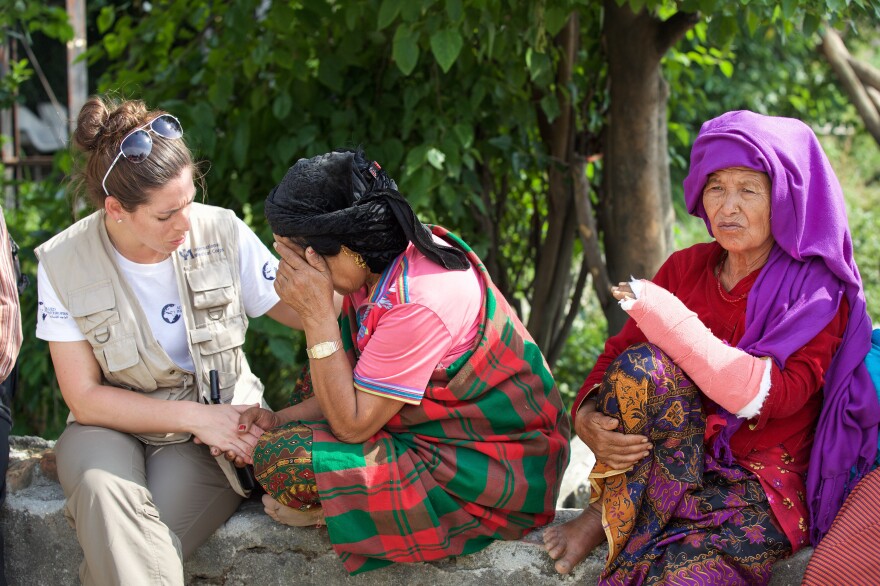It was a hospital — but to psychologist Inka Weissbecker it looked more like a prison. She had come to South Sudan to check out the country's only health facility for treating patients with mental illness.
"There was a hallway leading past these cells with bars on them," she recalls. "Behind one set of bars I saw a mattress covered in plastic. And on it was urine and feces — and this woman lying with her face to the wall. I don't know if she was dead or just sleeping. Nobody seemed to care."
The year was 2013 and Weissbecker was on a fact-finding mission for International Medical Corps in her capacity as the aid group's adviser on global mental health and psychosocial issues. Shortly afterward she met with the representative of a major international organization that was bankrolling IMC's work in South Sudan to plead for more funding for mental health services there. Weissbecker says she described not only the patients she'd seen at the hospital, but another image that haunts her to this day: a little girl wandering alone in the hallway. "She must have been about 4 years old. She had on a little torn T-shirt and she looked completely lost, with these big eyes. Probably her mother was in the ward, but I don't know for sure. Nobody was paying any attention to her."
Weissbecker says her presentation was short but "impassioned." Yet the donor was unmoved. "The donor basically said, that's all very nice, but South Sudan has so many other problems. There's such high maternal mortality. We can't afford to pay for mental health. In fact, I think his exact words were 'South Sudan is not ready for mental health.' "
This week Weissbecker has been among a chorus of voices calling for a rethink of that attitude. The World Health Organization and the World Bank have been holding a groundbreaking conference in Washington on how to make funding of mental health care more of a priority — particularly in low- and middle-income countries.

Like other advocates, Weissbecker points to statistics documenting the toll that mental illness takes on not just individuals but on national health systems and economies. She has seen this impact firsthand through her work with IMC, which has incorporated mental health services in the medical programs it runs in more than 20 countries. We asked her to tell us about the experiences that have affected her most profoundly — both successes and horror stories.
Her first recollection comes from a camp for Somali refugees in Ethiopia, which she visited in 2013. There she met a father who for years had struggled with how to help his son. When the family lived in Somalia, a fragile country with very little health care, no one knew what was wrong with the boy. The family "just saw him as violent, and aggressive, trying to run off all the time, speaking to people who weren't actually there."
The father thought his son might be possessed by evil spirits and took him to a traditional healer. When that didn't help, he kept him chained up.
But things changed in the refugee camp. A psychiatric nurse working for IMC saw the chained man — then in his 20s — and was able to diagnose his schizophrenia and get him on medication. She also worked with the family to help them understand the source of the problem and the importance of working with the son to ensure he stayed on his medication. The result was life-changing.
"He was able to improve to the extent that the father removed the chains," says Weissbecker. "He became part of the family again, contributing to daily chores. And the father told me he even went to his community to show them the chains and tell them, 'I used these chains on my son. But it turns out he just had a mental illness. And mental illness is treatable.' It was such a powerful message."
Then there was the mother of two adolescent girls whom Weissbecker met in Gaza. She seemed a bright, confident woman, all smiles. But she told Weissbecker that for years she had struggled with crippling depression. "She didn't even have energy for housework. When the family would come over to cook together she'd just withdraw."
Unlike in Somalia or South Sudan, mental health care was available. But even as the woman's daughters urged her to get help, she was daunted by another obstacle: the stigma around mental illness in many cultures. "She would tell her daughters, I can't go to a psychologist or psychiatrist. Only crazy people see them." When, thanks to the continued encouragement of her daughters she finally did seek treatment she was so proud of the transformation that she became a volunteer with a program run by IMC to educate the community about depression. "She really wanted to spread the message that you should not be ashamed."
As for her unsuccessful effort in South Sudan, Weissbecker said there was a bittersweet coda. Soon after her ill-fated meeting with the donor, the long-standing conflicts there escalated once again. "Suddenly all these donors were saying, 'Oh, there's a crisis there. Everybody's going to be traumatized and there will be a need for mental health care.' So all this funding came through."
While she's grateful that IMC has been able to use that assistance to offer services to people displaced by the violence, she says that "South Sudan needs more than that — there is always a need for mental health. And there is a moral obligation to provide it."
Copyright 2021 NPR. To see more, visit https://www.npr.org.








